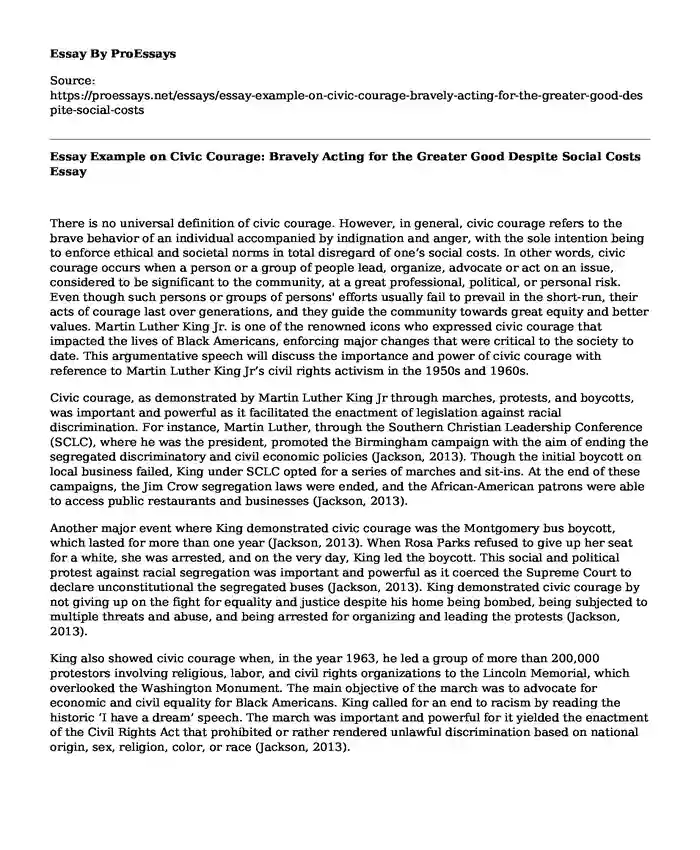There is no universal definition of civic courage. However, in general, civic courage refers to the brave behavior of an individual accompanied by indignation and anger, with the sole intention being to enforce ethical and societal norms in total disregard of one’s social costs. In other words, civic courage occurs when a person or a group of people lead, organize, advocate or act on an issue, considered to be significant to the community, at a great professional, political, or personal risk. Even though such persons or groups of persons' efforts usually fail to prevail in the short-run, their acts of courage last over generations, and they guide the community towards great equity and better values. Martin Luther King Jr. is one of the renowned icons who expressed civic courage that impacted the lives of Black Americans, enforcing major changes that were critical to the society to date. This argumentative speech will discuss the importance and power of civic courage with reference to Martin Luther King Jr’s civil rights activism in the 1950s and 1960s.
Civic courage, as demonstrated by Martin Luther King Jr through marches, protests, and boycotts, was important and powerful as it facilitated the enactment of legislation against racial discrimination. For instance, Martin Luther, through the Southern Christian Leadership Conference (SCLC), where he was the president, promoted the Birmingham campaign with the aim of ending the segregated discriminatory and civil economic policies (Jackson, 2013). Though the initial boycott on local business failed, King under SCLC opted for a series of marches and sit-ins. At the end of these campaigns, the Jim Crow segregation laws were ended, and the African-American patrons were able to access public restaurants and businesses (Jackson, 2013).
Another major event where King demonstrated civic courage was the Montgomery bus boycott, which lasted for more than one year (Jackson, 2013). When Rosa Parks refused to give up her seat for a white, she was arrested, and on the very day, King led the boycott. This social and political protest against racial segregation was important and powerful as it coerced the Supreme Court to declare unconstitutional the segregated buses (Jackson, 2013). King demonstrated civic courage by not giving up on the fight for equality and justice despite his home being bombed, being subjected to multiple threats and abuse, and being arrested for organizing and leading the protests (Jackson, 2013).
King also showed civic courage when, in the year 1963, he led a group of more than 200,000 protestors involving religious, labor, and civil rights organizations to the Lincoln Memorial, which overlooked the Washington Monument. The main objective of the march was to advocate for economic and civil equality for Black Americans. King called for an end to racism by reading the historic ‘I have a dream’ speech. The march was important and powerful for it yielded the enactment of the Civil Rights Act that prohibited or rather rendered unlawful discrimination based on national origin, sex, religion, color, or race (Jackson, 2013).
Conclusion
In conclusion, civic courage is very important and powerful. Through civic courage, King was able to shape the history of America by achieving great milestones in ensuring that the African-Americans were treated with respect and equality. King was able to root out Jim Crow segregation laws that had existed for centuries. Further, he compelled the Supreme Court to declare unconstitutional the segregated buses and ended the discrimination of the African-Americans. Lastly, King’s civic courage saw the enactment of the Civil Rights Act.
References
Jackson, T. F. (2013). From civil rights to human rights: Martin Luther King, Jr., and the struggle for economic justice. University of Pennsylvania Press. DOI: https://doi.org/10.9783/9780812200003
Cite this page
Essay Example on Civic Courage: Bravely Acting for the Greater Good Despite Social Costs. (2023, Sep 10). Retrieved from https://proessays.net/essays/essay-example-on-civic-courage-bravely-acting-for-the-greater-good-despite-social-costs
If you are the original author of this essay and no longer wish to have it published on the ProEssays website, please click below to request its removal:
- Cult of Likability Essay
- Essay Sample on World War II Generation
- Essay Example on Same-Sex Marriage: A Historical Perspective
- Essay Sample on Parents' Responsibilities & Children's Rights Under Family Law Act
- Community Policing: Enhancing Public Safety Through Collaboration - Research Paper
- Essay Example on Teen Depression: A Serious Mental Health Issue
- Bridging Gaps, Fostering Maturity, and Building Meaningful Relationships in Organizations - Paper Sample







